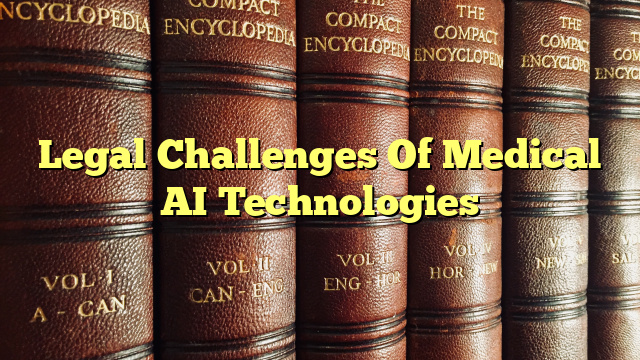Legal Challenges of Medical AI Technologies
Table of Contents
Legal Challenges of AI in Healthcare
Artificial Intelligence (AI) technologies are rapidly transforming the healthcare industry, providing new opportunities for diagnosis, treatment, and patient care. However, along with these advancements come several legal challenges that need to be addressed.
One of the main legal challenges of AI in healthcare is the issue of liability. As AI systems become more autonomous and make decisions that directly impact patient outcomes, it becomes crucial to determine who is responsible in case of errors or harm caused by these systems. Traditional legal frameworks may not be equipped to handle these complex scenarios, leading to uncertainty and potential legal disputes.
Another challenge is privacy and data protection. AI systems require access to large amounts of patient data to train and improve their algorithms. However, this raises concerns about the privacy and security of sensitive medical information. Healthcare organizations must ensure that proper consent and data protection measures are in place to safeguard patient privacy and comply with relevant regulations such as the General Data Protection Regulation (GDPR).
Additionally, there are challenges related to intellectual property rights. AI technologies often involve the use of proprietary algorithms and datasets, which can raise questions about ownership and licensing. Clear guidelines and regulations are needed to address these issues and encourage innovation while protecting the rights of developers and organizations.
Regulatory Compliance
AI technologies in healthcare must also comply with existing regulations and standards. This includes ensuring that the algorithms used are accurate, reliable, and transparent. Regulatory bodies may need to adapt their frameworks to accommodate the unique characteristics of AI systems and establish clear guidelines for their development, testing, and deployment.
Legal Issues Surrounding AI
AI technologies in healthcare raise several legal issues that need to be carefully considered. One of the main concerns is the potential for bias and discrimination. AI algorithms are trained on historical data, which may contain biases that can perpetuate inequality in healthcare outcomes. It is essential to address these biases and ensure that AI systems are fair and unbiased in their decision-making processes.
Another issue is transparency and explainability. AI systems often operate as “black boxes,” making it difficult to understand how they arrive at their decisions. This lack of transparency can hinder trust and accountability. Efforts are being made to develop techniques for explaining AI decisions and ensuring transparency, but more work is needed in this area.
Lastly, there are concerns about the ethical implications of AI in healthcare. For example, the use of AI in end-of-life decision-making raises questions about the role of technology in sensitive and emotionally charged situations. Ethical frameworks and guidelines are necessary to ensure that AI technologies are used responsibly and in line with societal values.


The implementation of medical AI technologies has further complicated the legal framework due to its complexities and lack of established protocols. Privacy, liability, and consent are all legal issues to consider when using AI in medical contexts.